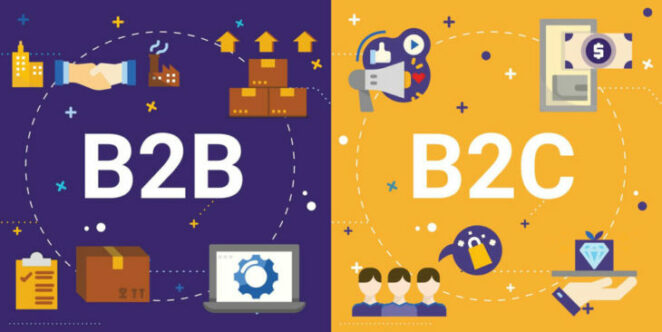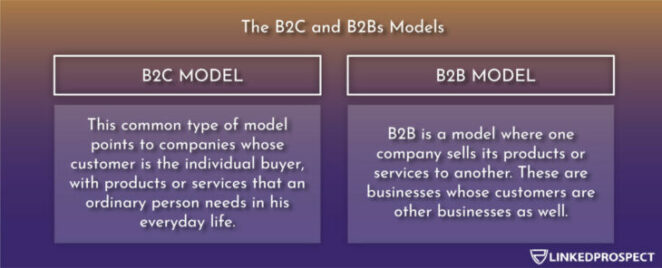

We know that companies operate with profit as their end-goal, but not all have the same means of achieving it. Apart from the obvious differences in products and services, business ventures actually have another characteristic that categorizes them into two: Their customers.
For marketers, understanding what separates one from the other is crucial to create an effective strategy. Although they have a single business goal, the means to an end isn’t always the same because they cater to unique audiences.
By now, we’re familiar with business-to-consumer (B2C) companies. But what exactly sets it apart from business-to-business (B2B)?
The B2C and B2Bs model

To start off, let’s lay down a definition of the two models.
We’ve been exposed to B2C since we were young. This common type of model points to companies whose customer is the individual buyer, with products or services that an ordinary person needs in his everyday life. We see these in groceries and retail stores, like a skincare company that sells facial wash or a bookstore that sells school supplies.
On the other hand, B2B is a model where one company sells its products or services to another. These are businesses whose customers are other businesses as well. This can be an accounting firm that offers services to a startup or an advertising agency that sells social media management services to a brand.
Customers vs. Decision-makers
The main difference between B2C and B2B sales is that one sells to the common buyer, while the other sells to high-level decision-makers.
Working in B2B is usually more demanding because clients are well-versed in the field. When you’re pitching your LinkedIn marketing strategy to a company’s brand manager, you can expect them to know just as much about campaign ROIs as you do.
In B2C, anyone can buy your product, whether it’s first-timers or regulars. While the winning factor in B2B is showing that you’re prepared and have a firm grip of your products, this isn’t as crucial for B2C.
What does this mean for marketers?
B2B and B2C marketing strategies are far from identical.
Because both models cater to two different target audiences, marketers have various buying decision factors to consider. In B2B sales, clients’ purchases are planned and logical and are based on business needs. Before signing a check, all business deals go through a rigorous decision-making process between several departments.
If you’re selling to an individual buyer, it’s a different story. Usually based on emotion, wants, and desires, it’s impulsive purchases that come to play in B2C sales.
Additionally, brand values between the two types of buyers differ.
With B2B sales, clients value trust and mutual relationships above all. Ever notice how most business proposals start off with a quick dinner and a visit to the golf course? That’s because to make a sale, business leaders first have to show that they are genuinely interested in their prospects and the problems they want to solve. You’ll notice that most LinkedIn marketing strategies for B2B businesses revolve around social selling and lead generation.
It isn’t exactly the same for the ordinary customer. When we visit the grocery to buy our usual pack of coffee, we have little to no interaction with the workers. And before we make the decision to purchase anything, it’s advertising and promotion that sparks our interest.

How do they sell?
B2C and B2B also sell their products or services differently. You’ll commonly find B2C companies in retail stores or e-commerce websites. Because their marketing is focused more on putting their products forward, you’ll rarely have a first-hand conversation with any of the company’s employees. Payment is the end of your customer journey.
With B2B sales, it isn’t the same thing. While some have their own websites, most of their marketing is through proactive lead generation. Marketers commonly reach out to leads individually through email, calls, or platforms like LinkedIn.
While B2C sales don’t focus much on lead generation, B2B pushes its strategy to find prospects. LinkedIn is the most common platform for marketers to hunt for clients, and some do it through cold messaging or social selling.

Pricing matters
Customers love to haggle, and many B2C sales companies are pretty flexible with their pricing. However, the prices are similar across all their products and customers. Before a customer can enjoy the item, he needs to pay – whether a full amount or a down payment – upfront.
In B2B sales, pricing may vary per client. This is especially true for bulk orders or regular clients, where businesses and customers usually negotiate on the terms and discounts. They don’t pay at the time of the order because invoices are generally sent once the products or services have been fully delivered.

A quick summary
If you’re torn between choosing B2B and B2C sales, remember that it all depends on what and how you’d like to sell your products and services.
Your target market will be much narrower with B2B sales. Most of your time will be spent understanding your potential clients. In B2C sales, customers are easier to sell to because they’re greatly influenced by trends and impulses. They don’t need the approval of a department or board, and less is at stake when they purchase the next must-have-item on the market. Doing business with high-level executives isn’t as lenient.
B2B requires more work both before and after purchase. If you’re up for the challenge, it can be even more rewarding than a simple B2C sale.
Before you make that decision, it’s best to assess the type of products and services you offer and how well you can pitch them to your audience. Choosing B2B or B2C sales won’t guarantee a successful business, but the correct model will definitely skyrocket your business to greater heights!

